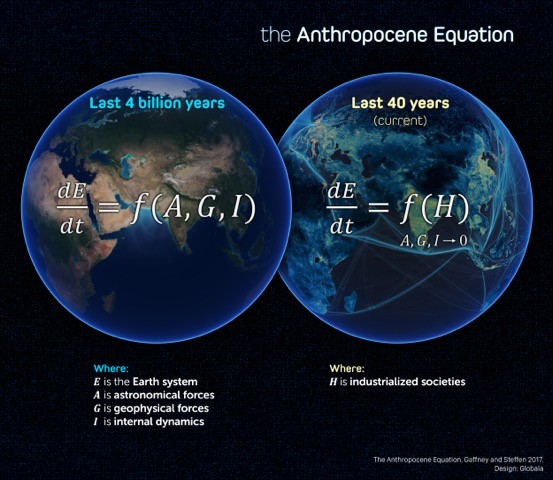By Ana Verayo, | February 19, 2017

Human activity has caused exceptionally rapid change to Earth, and scientists describe this as the "Anthropocene Equation." (Gaffney/Steffen/Globaia 2017)
Scientists say that human activity is changing the planet's climate and transforming Earth 170 times faster than nature. This new study also reveals an "equation" that identifies humans as the main cause of global warming.
This new study by researchers from the Stockholm Resilience Centre shows that global temperatures have significantly decreased to 0.01 degrees over 100 years. This is called the "baseline rate" for global temperatures and has been occurring for 7,000 years.
Like Us on Facebook
However, in the last 45 years or so, global temperatures have increased to 1.7 degrees Celsius for every century. This also included the 12 warmest years ever recorded since 1998.
Researchers explained that there are multiple astronomical and geophysical forces that have shaped the Earth's ecosystems along with biospheric forces during the planet's four billion year history. However, human activity has caused exceptionally rapid rates of change, which scientists describe as an "Anthropocene Equation."
The Anthropocene is a new geological era in which we are now living in. This also means that human activity is imposing a significant change on the environment and various ecosystems around the world.
According to the co-author of the study, Owen Gaffney from the Stockholm Resilience Centre, the rate of carbon emissions in the atmosphere is the highest ever in 66 million years. This also suggests that this is the highest since the dinosaurs walked the earth.
Researchers have also revealed that there is an alarming rate of biodiversity in recent decades which marked the dawn of the new age of the Anthropocene. This also means that this is the third stage of the Earth's biosphere evolution, from the microbial stage of life that occurred 3.5 billion years ago to the Cambrian Explosion 650 million years ago.
Astronomical and geophysical forces have a slow nature and rarely occur, including the internal dynamics of the planet. However, all of these forces still exert pressure,but their magnitudes are significantly less than human impact.
According to the co-author of the study, Will Steffen of the Stockholm Resilience Centre, to solve this equation, there should be a biosphere positive approach when it comes to the economic development of the Anthropocene age. Simply put, we need more carbon storage and totally eliminate carbon emissions along with the purification water and soil and to ultimately enhance biodiversity.
This new study was published in the journal, The Anthropocene Review.
-
Use of Coronavirus Pandemic Drones Raises Privacy Concerns: Drones Spread Fear, Local Officials Say

-
Coronavirus Hampers The Delivery Of Lockheed Martin F-35 Stealth Fighters For 2020

-
Instagram Speeds Up Plans to Add Account Memorialization Feature Due to COVID-19 Deaths

-
NASA: Perseverance Plans to Bring 'Mars Rock' to Earth in 2031

-
600 Dead And 3,000 In The Hospital as Iranians Believed Drinking High-Concentrations of Alcohol Can Cure The Coronavirus

-
600 Dead And 3,000 In The Hospital as Iranians Believed Drinking High-Concentrations of Alcohol Can Cure The Coronavirus

-
COVID-19: Doctors, Nurses Use Virtual Reality to Learn New Skills in Treating Coronavirus Patients







